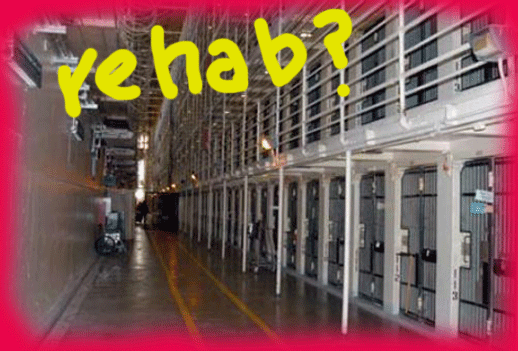
Seventy percent of all of the 2 million inmates in American prisons are doing time for drug and alcohol-related crimes. Only 15 percent of those prisoners are treated for their addiction.
NPR has this story about a promising pilot program at San Quentin in which inmates are being trained to become drug counselors.
In the course of my work, I seen the effects of this lack of treatment demonstrated anecdotally, over and over again. So many guys I’ve known can’t seem to get out of the revolving door incarceration cycle because, despite initial good intentions when they’re released from prison, most have never been treated for their addictions (or for the underlying conditions that created them). This usually also means they have not developed the necessary emotional tools to stay off drugs when the going gets rough on the outside, which it inevitably does. (Heck, the going gets rough at times for all of us.)
So, at some point they hit a bump in the road, and start using again, at first just a little, then a lot. Then they don’t report to their parole officers because they know they’ll test dirty. And then they’re on the run. And before long, they’re arrested again for absconding….or whatever. And they go back to prison.
It’s depressingly predictable. Human lives that might otherwise have promise continue to be wasted. And the tax payers pick up the tab. Nobody wins.
Right now, I have two people calling me collect from the LA County jail who are in the last stage of this dispiriting cycle. And it ain’t the first time they’ve run this track, not by a long shot.
So to me, the San Quentin program sounds like a smart strategy that is desperately needed and should be replicated ASAP.
And just so this post would have an invigorating sound track, I located the following:

Over and over, I wonder why people, knowing how horrible prison can be, still go back and commit crimes and re-enter it. Once would sure would be enough re-hab incentive for me.
Not to compare prison to marriage, but I asked a friend of mine the other day, after his second divorce was final, if he was going after number three or had decided that it wasn’t for him. We’ll see, but I don’t know what it takes for people to learn their lessons.
Maybe changes are in order, but I’m not sure that it’s right to blame the prison system for people who are intent on going right back into it.
I AGREE THE PERSON DOES HAVE TO WANT TO CHANGE IN ORDER TO AVOID GOING BACK IN BUT ALSO THE SYSTEM IS LOW ON PROGRAMS AND EFFECTIVE REHABILITATION FOR THE MEN IN ORDER TO RELEASE THEM OUT TO THE FREE WORLD ON A BETTER BASIS…THATS WHY THE CALIFORNIA DEPT OF CORRECTIONS AND REHABILTATION ADDED THAT BECASUE THAT WAS SAPPOSE TO BE IMPLEMENTED BUT WE SEE ALOT OF TIMES ITS NOT AVALIBLE……BEING INSTITUTIONZED IS ALSO A FACTOR IN THE MENS REHAB WHEN THEY COME OUT ALOT OF TIMES THEY REOFFEND BECAUSE THEY ARE SO STUCK ON OLD WAYS WE NEED HELP FOR THSE MEN TO PICK THEM SELEVS UP…ALSO FROM EXPERINCE HAVING MEN WHO HAVE A LOVED ONE WHO HELPS AND SUPPORTS THEM WHILE INSIDE AND ON THE OUTS ARE LESS LIKEY TO REOFFEND ALOT OF MEN ARE LEFT ABANDONED BY THEIR FAMALIES THEREFORE DONT CARE